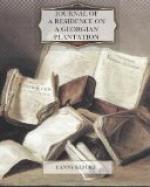That the emancipation of the negroes need not necessarily put them in possession of the franchise is of course obvious, but as a general consequence the one would follow from the other; and at present certainly the slaveholders are no more ready to grant the political privilege than the natural right of freedom. Under these circumstances, though the utmost commiseration is naturally excited by the slaves, I agree with you that some forbearance is due to the masters. It is difficult to conceive a more awful position than theirs: fettered by laws which impede every movement towards right and justice, and utterly without the desire to repeal them—dogged by the apprehension of nameless retributions—bound beneath a burthen of responsibility for which, whether they acknowledge it or not, they are held accountable by God and men—goaded by the keen consciousness of the growing reprobation of all civilised Christian communities, their existence presents the miserable moral counterpart of the physical condition of their slaves; and it is one compared with which that of the wretchedest slave is, in my judgement, worthy of envy.
* * * * *
Letter to C.G., Esq.
Before entering upon my answer to your questions, let me state that I have no claim to be ranked as an abolitionist in the American acceptation of the word, for I have hitherto held the emancipation of the slaves to be exclusively the business and duty of their owners, whose highest moral interest I thought it was to rid themselves of such a responsibility, in spite of the manifold worldly interests almost inextricably bound up with it.




